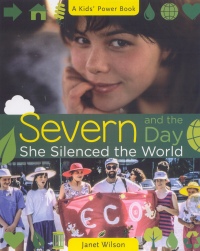| ________________
CM . . .
. Volume XXI Number 4 . . . . September 26, 2014
excerpt:
An award-winning author, Wilson has written another powerful work of creative nonfiction with an environmental focus. In Wilson’s telling the backstory of child activist Severn Cullis-Suzuki’s address to the United Nations plenary meeting at the Earth Summit in Rio de Janeiro on June 12, 1992, the story becomes more of a collective biography of a remarkable group of friends, aged 12 and 13, who founded the Environmental Children’s Organization (ECO) in Vancouver and dreamed of a more sustainable and environmentally conscious way of living and greater equity in the world. It is an inspiring tale. Severn is the eldest daughter of Tara Cullis and environmentalist David Suzuki, and thus she had a first-hand encounter with environmental and global issues from an early age. Conversation around the dining table and countless encounters with activists helped her to achieve an awareness of issues that many kids her age gave limited thought to. Her family’s hosting of an indigenous Kayapo family from the Amazon rainforest and a subsequent visit to their threatened homeland sets a backdrop for Severn’s growing awareness of the conflict that exists between have and have-nots. At the start of sixth grade, Severn and her friends, Tove, Michelle, Morgan and Vanessa, founded the ECO with the intent of raising funds by making and selling handicrafts in support of rainforest protection. This led to cooperation with an environmental youth group that taught them about newsletter creation. The girls were encouraged by a teacher to make an address to their school mates, and they soon were making presentations to others. The need for a water filter in a rainforest community in Borneo became the beneficiary of their first fundraising efforts. Upon learning that Brazil was to host an Earth Summit that would bring together world leaders and negotiators to discuss environmental issues in just over a year, Severn had an idea. ECO should attend the Summit so that children’s concerns could be aired by children. Initially, her friends and her parents all thought the idea outrageous, but they soon learned that a stubborn young girl with a crazy idea can be an unstoppable force. As the narrative unfolds, the impossible becomes a reality, and eventually three of the ECO founding members are able to attend the Summit where ECO was assigned its own booth. The girls worked hard to share their message with attendees and continued to hone their speech writing and public speaking skills. At the last minute, there was an opportunity for Severn to address the last UN plenary session. The address that she wrote and delivered is included in full in the book. It is an earnest address from a child to the adults that challenges them to take action on environmental problems and economic inequity in order that the world that their children inherit will be liveable and wonderful. Wilson captures the fun and laughter of the girls that she writes about, and their determination to do what they can to make the world a better place. Through skilfully crafted dialogue, the reader becomes present as the girls discuss their club’s initiatives, manufacture gecko pins for sale, and in Brazil, share laughs at the dental-floss like outfits that pass as swimwear. The inclusion of relevant photographs and reproductions of selections from ECO newsletters adds to the sense of immediacy that the book conveys. The epilogue is a welcome addition that briefly tells the situation of the main characters today, more than twenty years following the tumultuous year that culminated in attendance and addresses at the 1992 Earth Summit. Highly Recommended. Val Ken Lem is a librarian at Ryerson University in Toronto, ON.
To comment on this title or this review, send mail to cm@umanitoba.ca.
Copyright © the Manitoba Library Association. Reproduction for personal use is permitted only if this copyright notice is maintained. Any
other reproduction is prohibited without permission.
CM Home | Next Review | Table of Contents for This Issue - September 26, 2014 | Back Issues | Search | CM Archive | Profiles Archive |
